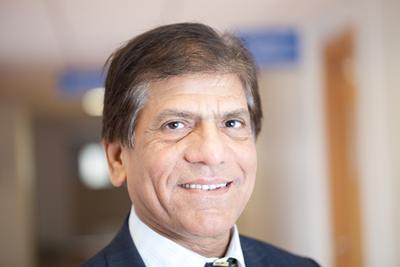Professor Syed Hasan Arshad MBBS, DM, FRCP
Professor of Allergy and Clinical Immunology, Director of the David Hide Asthma and Allergy Research Centre, Isle of Wight.

Professor Hasan Arshad is Professor of Allergy and Clinical Immunology within Medicine at the University of Southampton and lead allergy research at Southampton and the Isle of Wight.
The holy grail of asthma and allergy research is to prevent their development in children. That has been my passion for over 20 years and I believe we will achieve this in the not too distant future
Professor Arshad was appointed to the Chair of Allergy and Clinical Immunology in 2009. He is also a consultant Physician at Southampton University Hospital Trust and Director of The David Hide Asthma and Allergy Research Centre in Isle of Wight. Having graduated in Medicine from the University of Karachi, he trained in General Medicine and then specialised in Respiratory Medicine in the UK. He completed his DM from Southampton University working on prediction and prevention of asthma and allergic disease. Following a post-doc fellowship at the Johns Hopkins University in Baltimore, and a Senior Lectureship at Keele University, he was appointed to his current position in Southampton.
Professor Arshad leads a group that investigates natural history, genetic and environmental risk factors and prevention of asthma and allergic disease. He is a clinical epidemiologist with expertise in birth cohort studies, clinical trials, and the immunological and genetic basis of asthma and allergy. His research is based within the Faculty of Medicine and at The David Hide Asthma and Allergy Research Centre on the Isle of Wight. The group includes both clinical and non-clinical scientists, clinical research fellows and nurses.
In the last 10 years, Professor Arshad has attracted grants of over £10 million, published over 200 articles in peer reviewed journals, authored or edited 3 books and 7 book chapters, and supervised several MSc, DM and PhD students. He has contributed to national and international guidelines, including the European guidelines for asthma and allergy prevention and National Institute of Health (US) guidelines for the diagnosis and management of food allergy. He is also a member of the expert panel of the National Institute of Health (US), to review grants and formulate strategy for research. He was awarded Pfizer Visiting Professor to the Michigan State University, Michigan, USA in 2004 and recently his David Hide Centre team won the "excellence in research" award at the Isle of Wight NHS Trust annual award ceremony. In 2015, he was awarded the prestigious Jack Pepys award by the British Society of Allergy & Clinical Immunology of outstanding contribution to the science of allergy and immunology.
Qualifications
MBBS, Medicine and Surgery, Dow Medical College, (1979)
MRCP, Medicine, Royal College of Physicians (UK), (1986)
DM, Allergy, University of Southampton, (1993)
FRCP, Medicine, Royal College of Physicians (London), (2002)
Appointments held
Clinical Research Fellow, David Hide Asthma and Allergy Centre and University of Southampton. 1988-2002
Post-doctorate Fellow, Johns Hopkins University, Baltimore, Maryland. 1993-1994
Consultant Physician, St. Mary’s Hospital, Isle of Wight and Director of David Hide Asthma and Allergy Research Centre, Isle of Wight. 1997-2003
Senior lecturer, Keele University, Keele, Staffordshire. 2003-2007
Reader, University of Southampton. 2007-2009
Professor of Allergy and Clinical Immunology, University of Southampton. 2009-present